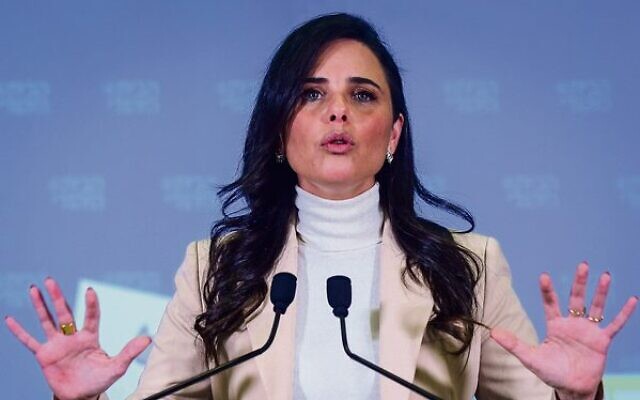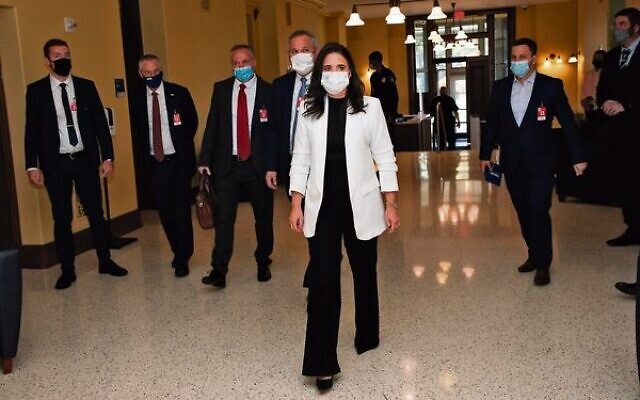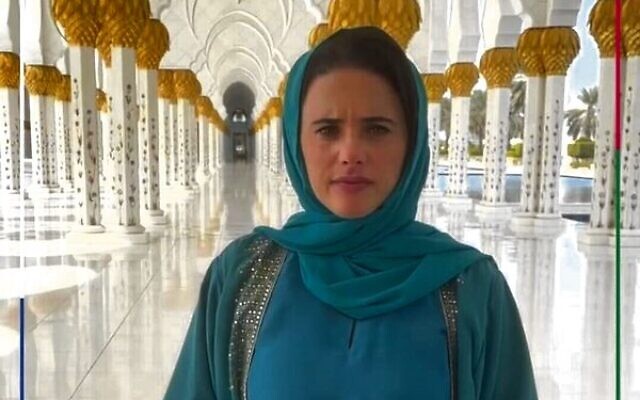One-on-one with Ayelet Shaked
During her visit to Australia for the United Israel Appeal, Israel's former justice minister and interior minister Ayelet Shaked spoke to The AJN.

You are very much seen as an early and strong supporter of changes to Israel’s judiciary, dating back to your 2017 speech to the Israel Bar Association. Why do you believe the court’s role needs to be more limited?
For many years, the court expanded its power over the government because Israel doesn’t have a constitution, unlike in Australia. The court took responsibilities and authority away from the government. When I began office [as justice minister], the court was very liberal and progressive. And I succeeded in building a conservative camp in the [Supreme] court. So today, the court is much more balanced and much more diverse than in the past.
Unlike, for example here in Australia, in Israel there is no second legislative chamber, no constitution, there are no geographic electorates and no federated states. What do you say to critics who argue the Supreme Court is the only check and balance against the Knesset and so it should be left alone?
First of all, we have a very strong Supreme Court. And that’s good. It’s not that we want to weaken the court. It’s important to keep the judicial system independent, strong, and professional. And this is, of course, something that’s crucial for Israeli democracy. It’s true that we don’t have the system of checks and balances like you have in Australia, or like the US, because we don’t have two houses, we don’t have a constitution.
But Israel is a very viable democracy. We belong to a very exclusive club of 21 countries that were established as democracies. And if the government wants to do a change in the way we select judges, it’s not the end of Israeli democracy. I think people can calm down – both in Israel and in the Diaspora. And we should check every reform that the government wants to do, and see if it can help or if it can damage.
And you see also the demonstrations in Israel shows how much democracy is alive and how much it is important for the people to feel that they have freedom of speech, rights, everything.

But it has been said that in the three decades that the Supreme Court has had the power to cancel laws it finds are not in accordance with the Basic Law, only 22 Knesset laws have been cancelled, a low interference rate by world standards. Why is there so much focus on curbing the court’s discretionary role?
Because in Israel unlike in other countries, the Knesset didn’t give the Supreme Court this power, it just took it for itself. And you’re correct about the number [of times the court intervened]. But it was not just interfering in Knesset legislation but also into government decisions.
‘It’s not the end of Israeli democracy. I think people can calm down – both in Israel and in the Diaspora.’ Ayelet Shaked
The Supreme Court has ruled for the rights of non-Orthodox streams of Judaism – such as providing salaries to non-Orthodox rabbis on regional councils and accepting foreign conversions to Judaism for the purposes of aliyah. If the court’s powers are curbed, how will these rights be protected?
The court will not be curbed. The court will stay independent and defend human rights, women’s rights, minority rights. Nothing will be changed in this aspect. I have to emphasise I’m not in the government today but I’m just trying to explain. [The current government] just wants to change how we select judges, to give politicians more power in the [Judicial Selection Committee] that selects judges.
Beyond the court debate, as a former justice minister and an advocate for a greater public role for Israeli women, are you concerned that laws barring discrimination in public spaces are now under threat? For example, how do you respond to predictions that Israel’s buses could be gender-segregated again [if a Supreme Court ruling is overridden by the Knesset]?
No, excuse me, women in Israel can do anything and they have full rights. And you know, we have women all across the leadership, and in business, although not enough. And regarding [expanded gender] segregation, it concerns only ultra-Orthodox society. Ultra-Orthodox women also want to go to shows, to enjoy culture, theatre. And they aren’t going if it’s with men. So, sometimes, you need a theatre show for women only, for men only. There will be no change in the Israeli law regarding buses, or, in general. Also, I can tell you that I personally pushed to have specific classes in Israeli universities only for women and only for men in order to push ultra-Orthodox society into education.

How do you view plans to remove the so-called ‘grandchild clause’ from the Law of Return, which would make prospective olim with only a Jewish grandfather ineligible for aliyah? Aside from the justice issue, wouldn’t it cut off a large and talented pool of olim who could vastly help Israel’s economic development?
I don’t believe the government will do it. The Law of Return was changed in the 1970s when they added the grandchild clause, and although a few politicians from the current government are talking about [rolling it back], it’s not relevant, it’s not on the table.
The democracy crisis is not good for Israel. Iran and the Palestinians are monitoring it to see how they can gain from it. Israel’s economy is suffering. How can it be quickly resolved?
You’re very right; it’s not good for Israel. I think [Iran Supreme Leader Ali] Khamenei and [Hezbollah Secretary-General Hassan] Nasrallah can sit there and laugh. I hope that the government will put an end to it quickly, and we’ll find a compromise that everyone will be able to live with.
But what would you specifically suggest as a starting point to that dialogue?
I think a fair compromise in the [Judicial Selection Committee] could be just to switch the two Israel Bar Association members with legal professionals selected by the Minister of Justice. So it will give more power to the Minister of Justice, but on the other hand, the judicial system will keep its power because they have three judges, members, in the committee.

Photo: Courtesy
Earlier, you mentioned plans for greater secular education and greater workforce participation in Charedi communities. Can you expand?
It is kind of absurd that 50 per cent of ultra-Orthodox men are not going to work. They just study Torah. And I think it’s really important for Israeli society, for the Israeli economy, that they be part of the workforce. There are two problems. First is they do not study maths and English at school, only Torah. So we need to open more schools and to push these studies within yeshivot because they’re not studying that. And second, in universities, they won’t go if there’s no [gender] separation. So although now the universities in Israel are very liberal and open, and they don’t want to have specific classes only for women or only for men, but if you will not do so, [the ultra-Orthodox] will not come to study. So there are now some universities that understand that. And they’ve opened courses just for the ultra-Orthodox community.

comments